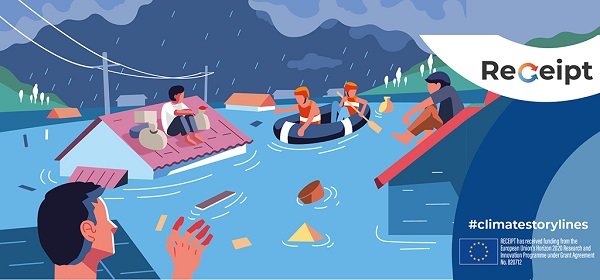RECEIPT Webinar
November 18, 2021 | h 11:00 – 11.30 am CET
Click on the following link for registration: https://bit.ly/2ZH9f0O
Speakers:
Patryk Kubiczek (Doctoral Researcher at Potsdam Institute for Climate Impact Research – PIK)
Esther Boere (Research Scholar at International Institute for Applied Systems Analysis – IIASA) – as discussant
Moderator: Reinhard Mechler (Research Group Leader and Senior Research Scholar at International Institute for Applied Systems Analysis – IIASA)
Abstract:
Climate change puts pressure on food systems not only due to slow-onset processes but also from the increasing occurrence of production failures due to extreme weather. International agricultural trade plays a pivotal role in securing a sufficient food supply in case of local shortages; at the same time, it exposes import-dependent countries to price spikes in the global markets. While during the two recent world food price crises in 2007-2008 and 2010-2012 most industrialized countries were able to insulate their domestic consumers from spiking world market prices, millions of people were pushed into food insecurity in developing countries, especially in Sub-Saharan Africa. It is of high relevance for the European Union, which is one of the key donors of humanitarian aid in that region.In this webinar, we will illustrate how a combination of local crop failures and disturbances to global agricultural markets can threaten food security in Sub-Saharan Africa. To this end, we will present a storyline compounding the 2019-2021 locust infestation in the Greater Horn of Africa by a hypothetical 2007-2008-like global food price crisis. We will further employ the INFORM Severity Index developed by the Joint Research Center of the European Commission to assess impacts of resulting undernourishment increase on subnational micro-storylines concerning recent humanitarian crises in Ethiopia, the region’s largest country. We will then provide an update on the development of Agrimate, an agent-based network model for price and trade flow anomalies for main staple crops such as wheat, rice, and corn. Designed to simulate plausible scenarios of shifting supplier portfolios in the aftermath of weather-or policy-driven supply shocks, Agrimate aims at resolving key characteristics of agricultural markets such as the seasonality of production and stock-keeping with at least monthly resolution. Finally, we will provide an outlook on our further research plans to estimate food security risks in the Greater Horn of Africa under different global warming scenariosH2020 RECEIPT –Remote climate effects and their impacts on European sustainability, Policy and TradeWP5 International cooperation, development and resilienceRECEIPT aims to provide relevant and quantitative information on the European risks from remote global climatic features using a novel scientific storyline concept that maps representative connections between European socio-economic activities and remote climatic hazards. In WP5, we are assessing how climate variability and change can undermine development progress, competitiveness, stability and resilience of countries with which the EU maintains strategic partnership relations.
Watch the video:
SHORT BIO:

Patryk Kubiczek is a doctoral researcher in the research group “Event-based modeling of the economic impact of climate change” at the Potsdam Institute for Climate Impact Research (PIK). He studies climate change implications for agricultural markets and the stability dimension of global food security with the help of agent-based modeling.

Esther Boere received her PhD from both Wageningen University and the Agricultural Economic Research Institute (LEI). She joined IIASA’s Ecosystems Services and Management (ESM) Program as a Research Scholar in January 2015. Her current scientific interests include the analysis and modeling of driving factors of (agricultural) land use change. At IIASA, she contributes to developing typologies and poverty analyses on smallholder farming in Ethiopia, which will subsequently be implemented in the global economic land use model GLOBIOM.

Reinhard Mechler has over 20 years of experience analyzing and addressing socio-economic aspects of disaster and climate change risks. His interest is to provide evidence-based advice to a wide range of public and private sector decision-makers to improve decisions and build resilience against salient risks. Currently, he is the leader of the Systemic Risk and Resilience (SYRR) Research Group in the IIASA Advancing Systems Analysis (ASA) Program. He has also been a visiting professor at the University of Graz and is a senior lecturer at the University for Economics and Business in Vienna.
HOW TO PARTICIPATE
November 18, 2021 – Zoom
Click on the following link for registration: https://bit.ly/2ZH9f0O
After registering, you will receive a confirmation email containing information about joining the webinar.
ORGANIZED BY:
Fondazione CMCC – Centro Euro-Mediterraneo sui Cambiamenti Climatici
CONTACTS
Elena Niero – [email protected]


